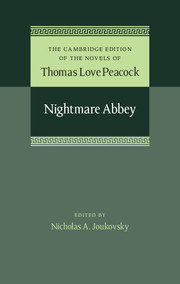Book contents
- Frontmatter
- Contents
- List of Illustrations
- General Editor’s Preface
- Acknowledgements
- Chronology
- List of Abbreviations
- Introduction
- Nightmare Abbey
- Appendix A Peacock’s Preface of 1837
- Appendix B An Essay on Fashionable Literature (1818)
- Appendix C The Four Ages of Poetry (1820)
- Note on the Text
- Emendations and Variants
- Ambiguous Line-End Hyphenations
- Explanatory Notes
- Select Bibliography
Chapter VIII
Published online by Cambridge University Press: 30 June 2022
- Frontmatter
- Contents
- List of Illustrations
- General Editor’s Preface
- Acknowledgements
- Chronology
- List of Abbreviations
- Introduction
- Nightmare Abbey
- Appendix A Peacock’s Preface of 1837
- Appendix B An Essay on Fashionable Literature (1818)
- Appendix C The Four Ages of Poetry (1820)
- Note on the Text
- Emendations and Variants
- Ambiguous Line-End Hyphenations
- Explanatory Notes
- Select Bibliography
Summary
MARIONETTA observed, the next day, a remarkable perturbation in Scythrop, for which she could not imagine any probable cause. She was willing to believe, at first, that it had some transient and trifling source, and would pass off in a day or two; but, contrary to this expectation, it daily increased. She was well aware that Scythrop had a strong tendency to the love of mystery, for its own sake; that is to say, he would employ mystery to serve a purpose, but would first choose his purpose by its capability of mystery. He seemed now to have more mystery on his hands than the laws of the system allowed, and to wear his coat of darkness with an air of great discomfort. All her little playful arts lost by degrees much of their power either to irritate or to soothe, and the first perception of her diminished influence produced in her an immediate depression of spirits, and a consequent sadness of demeanour, that rendered her very interesting to Mr. Glowry; who, duly considering the improbability of accomplishing his wishes with respect to Miss Toobad, (which improbability naturally increased in the diurnal ratio of that young lady's absence,) began to reconcile himself by degrees to the idea of Marionetta being his daughter.
Marionetta made many ineffectual attempts to extract from Scythrop the secret of his mystery; and, in despair of drawing it from himself, began to form hopes that shemight find a clue to it from Mr. Flosky, who was Scythrop's dearest friend, and was more frequently than any other person admitted to his solitary tower. Mr. Flosky, however, had ceased to be visible in a morning. He was engaged in the composition of a dismal ballad; and, Marionetta's uneasiness overcoming her scruples of decorum, she determined to seek him in the apartment which he had chosen for his study. She tapped at the door, and, at the sound “Come in,” entered the apartment. It was noon, and the sun was shining in full splendour, much to the annoyance of Mr. Flosky, who had obviated the inconvenience by closing the shutters, and drawing the window curtains. He was sitting at his table by the light of a solitary candle, with a pen in one hand, and a muffineer in the other, with which he occasionally sprinkled salt on the wick, to make it burn blue.
Information
- Type
- Chapter
- Information
- Nightmare Abbey , pp. 52 - 57Publisher: Cambridge University PressPrint publication year: 2016
